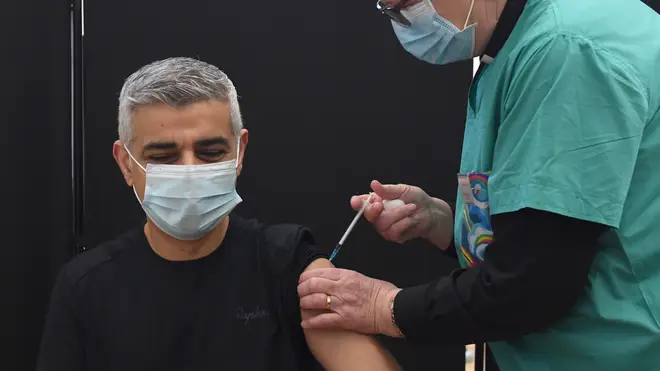
Shelagh Fogarty 1pm - 4pm
26 February 2021, 17:55 | Updated: 26 February 2021, 17:56

London Mayor Sadiq Khan has ended the capital’s ‘major incident’ status after Covid cases declined "significantly".
The status was bought in on January 8, after the London Mayor warned the pandemic was “out of control”.
Despite removing the status, Khan said the capital remained on “high alert”. There are currently more than 2,300 Covid patients in London hospitals.
READ MORE: People in their 40s next in line for Covid jabs, with no priority for teachers and police
READ MORE: Queen urges those worried about Covid jab to 'think about others rather than themselves'
Earlier this year the coronavirus infection rate in London exceeded 1,000 per 100,000 people, and at one point the Office for National Statistics estimated that as many as one in 30 Londoners had Covid.
Major incidents had previously been called for the Grenfell Tower fire and terror attacks at Westminster Bridge and London Bridge. It means the emergency services and hospitals cannot guarantee their normal level of response.
The R rate in London has now dropped to 0.6 to 0.8, meaning the number of infections is decreasing.

Queen urges those worried about Covid jab to 'think about others rather than themselves'
READ MORE: London Mayor Sadiq Khan declares 'major incident' due to Covid spread
READ MORE: UK Covid-19 alert level drops from level 5 to level 4 as threat to NHS recedes
This week the government launched a new campaign to encourage people to ‘keep going and stay at home’.
Nonetheless, Boris Johnson has revealed his roadmap to get people out of lockdown. It will see schools open on March 8 and no earlier than June 21 will all social contact restrictions be lifted.
It was also revealed that people in their 40s will be next in line for Covid jabs.
The Joint Committee on Vaccination and Immunisation (JCVI) has considered whether frontline groups such as teachers and police officers should be vaccinated next, but concluded that the most effective way to prevent death and hospital admission was to carry on prioritising people by age.
This group will be vaccinated once all those over-50s and the most vulnerable have received a jab.